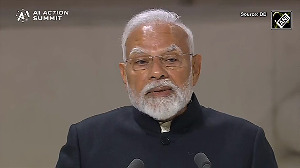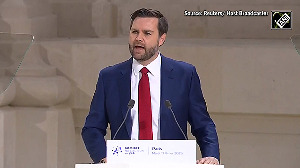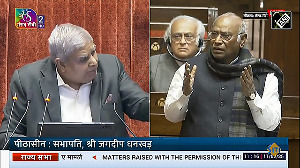The Swadeshi Jagran Manch fears that the government might not be able to protect the nation's interests at the World Trade Organisation meeting in Cancun (Mexico) from September 10 to 14.
The right-wing organisation has, thus, planned a maha dharna (massive demonstration) in New Delhi on September 2 to create awareness about the government's 'anti-people' economic policies. It will also send a three-member team to Cancun during the ministerial to register its protest.
The SJM team to go to Cancun includes economists Bhagwati Prakash Sharma and Dhanpat Agarwal. The third name has not yet been disclosed.
"We have held campaigns in various parts of the country to generate awareness about the anti-people economic policies of the central and state governments. We hope that the maha dharna will bring together representatives in our society to exert pressure (on the government) so that our national interests are not frittered away at the Cancun meet," said Ashwini Mahajan, SJM Delhi convenor.
SJM hopes to gather an estimated 25,000 entrepreneurs, advocates, financial experts, academicians, farmers and workers at Delhi's Ramlila Grounds on September 2 for the demonstration.
"It is an exercise to educate the people and put pressure on the government not to budge before the developed nations at the WTO," Mahajan said.
Expressing concern over the developed nations' clout to influence the WTO agenda, SJM's all-India convenor P Murlidhar Rao said: "We have experienced enough of WTO. The present framework of the WTO has exploitation and inequity as in-built features, and it is unacceptable to us."
He said that India must align with like-minded nations (in the WTO context) and fight the developed world as one. He also said that if the government is unsuccessful in protecting the nation's interests at the Cancun ministerial, India should quit the WTO.
Among the SJM demands before the Cancun meet are:
- The government must initiate a debate on the WTO issues in Parliament and the strategy to be adopted for the meet.
- Agriculture must be kept out of the WTO agenda as 'agriculture is a way of life in India and there is no justification for competition with developed nations in agriculture.'
- Negotiations on opening up of the services sector should be blocked 'as the United States and the European Union have not given promised to open up their services sector to the developing countries. Instead, they are trying to strip India of the benefits from information technology sector by creating new legislative barriers.'
- There should be effective negotiations on implementation issues like heavy agricultural subsidy, quantitative and other barriers on Indian exports by developed nations, patent regime, instead of talks on new issues like government procurement and investment. The SJM also feels there is no justification for international movement of capital without the movement of labour.
- National treatment for foreign multinational companies should be linked with national treatment of our workers, meaning the government's preferential treatment of foreign MNCs should be given to Indian workers too.
Referring to the unethical stand adopted by developed nations in previous WTO meets, Rao pointed out that for instance, at the Doha meet, India and other developing nations forced the issue of the use of compulsory licensing for pharmaceutical products. However, his complaint is that the developing nations are not ready to honour the letter and spirit of the meet.
Contending that the four issues -- investment, competition policy, transparency in government procurement and trade facilitation -- were the subjects discussed at the Singapore WTO meet, Rao said the investment agreement was designed to nurture the multinational companies. This is because of their target that their treatment should be at par with their domestic counterparts.
Consequently, developing nations are deprived of their ability to regulate foreign investment in national interests.
He also lamented that the government had reduced the tariffs to below the commitments made at WTO.
He contended that low tariffs, along with the lifting of quantitative restrictions in imports, were already creating havoc, especially in the small-scale sector. Developed countries were angling for further tariff reductions.
That the SJM is holding a large demonstration to create further public awareness on the dangers of non- protection of national interests at the Cancun WTO meet has its own tale to tell, as voiced by Mahajan.
"If that were to happen, we will welcome the government delegation returning from Cancun with black flags. And that would be just the beginning," Mahajan pointed out.
He did not wish to comment whether such an eventuality would jeopardise the ruling National Democratic Alliance's prospects of returning to power.






 © 2025
© 2025